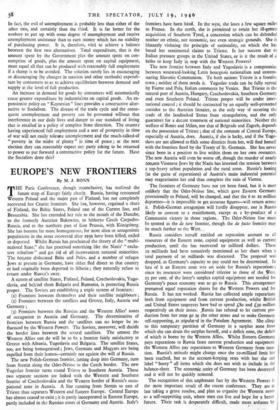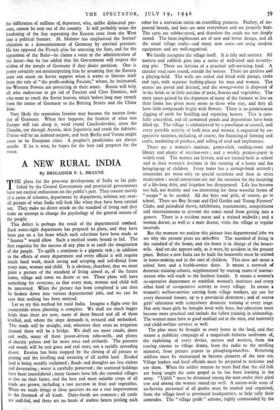EUROPE'S NEW FRONTIERS
By M. J. BONN
THE Paris Conference, though inconclusive, has outlined the future map of Europe fairly clearly. Russia, having renounced Western Poland and the major part of Finland, has not completely
recovered her Czarist frontiers. She has, however, regained a share of Finland, the Baltic States, Poland east of the Curzon line, and Bessarabia. She has extended her rule to the mouth of the Danube, to the formerly Austrian Bukowina, to hitherto Czech Carpatho- Russia, and to the northern part of East Prussia, with Konigsberg.
She has become far more homogeneous, for most alien or antagonistic populations in the areas recovered after 1939 have been killed, exiled or deported. Whilst Russia has proclaimed the theory of the " multi- national State," she has practised something like the Nazis' " exclu- sive tribalism " and got rid of all inconvenient national minorities. The 600,000 dislocated Balts and Poles, and a number of refugee Jews at present in Germany, have either fled direct to that country or had originally been deported to Siberia ; they naturally refuse to return under Russia's sway.
A screen of satellite States, Finland, Poland, Czechoslovakia, Yugo- slavia, and behind them Bulgaria and Rumania, is protecting Russia proper. The Soviets are establishing a triple system of frontiers : (a) Frontiers between themselves and their satellite neighbours ; (a) Frontiers between the satellites and Greece, Italy, Austria and Germany ; (3) Frontiers between the Russian and the Western Allies' zones of occupation in Austria and Germany. The determination of frontiers between Russia and the satellites can no longer be in- fluenced by the Western Powers. The Soviets; moreover, will decide the border lines between the several satellites. The utmost the Western Allies can do will be to fix a frontier fairly satisfactory to Greece with Albania, Yugoslavia and Bulgaria. The satellite States, too, are being homogenised ; Jews, Germans and Magyars are being expelled from their homes—certainly not against the will of Russia.
The new Polish-German frontier, jutting deep into Germany, runs from Stettin along the Oder-Neisse to the Czech- border. The new Yugoslav frontier turns round Trieste to Southern Austria. These two separate sections are linked with the Western and Southern frontier of Czechoslovakia and the Western border of Russia's occu- pational zone in Austria. A line running from Stettin to east of Trieste thus separates Western and Eastern Europe. Central Europe has almost ceased to exist ; it is partly incorporated in Eastern Europe, partly included in the Russian zones of Germany and Austria. Italy's frontiers have been fixed. In the west, she loses a few square miles to France. In the north, she is permitted to retain her ill-gotten acquisition of Southern Tyrol, a concession which can be defended neither on ethnic, nor economic, nor even strategic grounds. She is blatantly violating the principle of nationality, on which she has based her sentimental claims to Trieste. Is her success due to Italian pressure groups in the United States, or is it the result of a bribe to keep Italy in step with the Western Powers?
The new frontier between Italy and Yugoslavia is a compromise between westward-looking Latin bourgeois nationalism and eastern- staring Slavonic Communism. To both nations Trieste is a frontier town ; neither of them needs it. Yugoslav trade can be fully served by Fiume and Pola, Italian commerce by Venice. But Trieste is the natural port of Austria, Hungary, Czechoslovakia, Southern Germany and even Southern Poland. Trieste proper will be under inter- national control ; it should be connected by an equally well-protected corridor to the Austrian frontier, as the only way of securing the trade of the landlocked States from strangulation, and the only guarantee for a decent treatment of national minorities. Neither the welfare of Rome and Milan, nor that of Belgrade and Zagreb, depends on the possession of Trieste ; that of the remnant of Central Europe, especially of Austria, does. Austria, if she is lucky, and if the Yugo- slays are not allowed to filch some districts from her, will find herself with the frontiers fixed by the Treaty of St. Germain. She has never since been in a position to live within them on her own resources. The new Austria will even be worse off, though the murder of nearly zoo,000 Viennese Jews by the Nazis has lessened the tension between a top-heavy urban population and the rural areas. Russia's looting (in the guise of reparations) of Austria's main industrial potential may reagrarianise her and thus complete the ruin of Vienna.
The frontiers of Germany have not yet been fixed, but it is most unlikely that the Oder-Neisse line, which gave Eastern Germany provisionally to Poland, will be changed, and that the 6 to to million deportees—it is impossilile to get accurate figures—will return across it. Polish-German antagonism will hardly disappear, nor is Russia likely to consent to a resettlement, except as a by-product of a Communist victory in those regions.. The Oder-Neisse line must be treated as the de jure frontier, though the de facto frontier may be much farther to the West.
Russia considers herself entitled on reparation account to all resources of the Eastern zone, capital equipment as well as current production, until she has recovered to milliard dollars. These to milliards had been tentatively mentioned as her share when a total payment of 20 milliards was discussed. The proposal was dropped, as Germany's capacity to pay could not be determined. In lieu of it an Eastern zone was set aside for Russia's reparations ; since its resources were considered inferior to those of the West. 25 per cent. of the latter's surplus capital equipment not needed for
Germany's peace economy was to go to Russia. This arrangement presumed equal reparation shares for the Western Powers and for Russia. It has not worked. Russia has collected ample reparations both from equipment and from current production, whilst British and United States taxpayers have had to spend L80 and £50 million
respectively on their zones. Russia has refused to let current pro-
duction from her zone go the other zones and to make Germany self-supporting, as stipulated in the Potsdam Agreement. She clings to this temporary partition of Germany in a surplus zone from which she can drain the surplus herself, and a deficit zone, the deficit of which is borne by the Western Allies. Whilst Eastern Germany pays reparations to Russia from current production and equipment
the Western Allies pay reparations to Western Germany from taxa- tion. Russia's attitude might change once the to-milliard limit has been reached, but as the account-keeping rests with her she can label " booty " all items which she does not wish to include in the balance-sheet. The economic (unity of Germany has been destroyed and it will not 'be quickly restored.
The recognition of this unpleasant fact by the Western Powers is the most important result of the recent conference. They are at last taking a grave resolve, and plan to organise the Western zones as a self-suppoiling unit, where men can live and hope for a better future. Their task is desperately difficult, made more arduous by
the infiltration of millions of deportees, who, unlike dislocated per- sons, cannot be sent out of the country. It will probably mean the hardening of the line separating the Eastern zone from the West into a political frontier. M. Molotov has emphasised the Soviets' objection to a dismemberment of Germany by external pressure. He has opposed the French plan for annexing the Saar, and for the separation of the Ruhr—he claims a voice in the administration of the latter—but he has added that his Government will respect the wishes of the people of Germany if they desire partition. One is pretty certainly not misinterpreting him by assuming that the Eastern zone can count on Soviet support when it wants to liberate itself from the rule of " the profit-seeking Fascists," whom, he insinuated, the Western Powers are protecting in their zones. Russia will help all who endeavour to get rid of Fascists and Class Enemies, and who want to reach the Soviet heaven, which before long may stretch from the centre of Germany to the Behring Straits and the China Seas.
Very likely the reparation frontier may become the eastern fron- tier of Germany. When that happens, the frontier of what was Europe will run along it, wind round Czechoslovakia, cross the Danube, cut through Austria, skirt Jugoslavia and reach the Adriatic. Trieste will be an isolated outpost, and both Berlin and Vienna might cease to be European cities. A prophet's predictions are always unsafe. If he is wise, he hopes for the best and prepares for the worst.



























 Previous page
Previous page